OCCUPY CENTRAL - DAY 11: Full coverage of the day's events
PUBLISHED : Wednesday, 08 October, 2014, 8:34am
UPDATED : Friday, 10 October, 2014, 9:08am
ood evening and welcome to our continuing coverage of the Occupy movement.
An Australian newspaper has published a report questioning an alleged undisclosed payment of HK$49.9 million from an Australian firm that Chief Executive Leung Chun-ying received but failed to disclose upon assuming office. The Age report said Leung's office responded by saying he did not have to disclose the payment.
Large crowds have gathered at the main protest site in Admiralty after a quiet day as Friday's talks between Chief Secretary Carrie Lam Cheng Yuet-ngor and students approach.
Stay tuned for all the breaking news.
11.30pm: This concludes the SCMP's live coverage of the Occupy protests for tonight, unless there is specific breaking news. Join us again at 8am tomorrow to pick up on the day's developments.
11.00pm Mong Kok: Crowd numbers swell at Mong Kok protest site
10.30pm Admiralty: On Harcourt Road, hundreds of residents gather - either sitting on the ground or standing near the stage - to listen to a speech by Ed Chin, a core member of Occupy Central's finance group. Chin thanks foreign journalists for covering the sit-ins. He says his group of bankers and stockbrokers worry about "unjust" capital flowing from the mainland into Hong Kong, and that civil liberties in the city are diminishing.
10.15pm Admiralty: Pan-democratic lawmakers vow to impeach Chief Executive Leung Chun-ying over the HK$50 million he received from an Australian firm that he failed to declare prior to becoming chief executive. Labour Party councillor Cyd Ho said: "Apart from his duties as chief executive, Leung was also serving the needs of another company. This is a serious of conflict of interest." She says she hoped that pro-government lawmakers would not protect Leung.
 10pm Admiralty: Hong Kong's first "Legislative Council meeting-in-residence" takes place with 12 pan-democratic lawmakers - who were blocked by 41 pro-establishment lawmakers from having a normal Legco meeting today - taking to the stage at the Occupy rally in Admiralty to express their discontent with the government.
10pm Admiralty: Hong Kong's first "Legislative Council meeting-in-residence" takes place with 12 pan-democratic lawmakers - who were blocked by 41 pro-establishment lawmakers from having a normal Legco meeting today - taking to the stage at the Occupy rally in Admiralty to express their discontent with the government.
Civic Party's Alan Leong Kah-kit says he plans to ask the government who gave the order to fire tear gas at peaceful protesters on the night of September 28. Leong says he will also find out how pro-establishment lawmakers managed to suspend today's Legco session. Leong says he suspects they did this because they had "received messages that Beijing wants to fire" Leung Chun-ying, citing the curiously-timed breaking news today about Leung's HK$50 million "secret deal" with an Australian company.
Another Civic Party legislator, Claudia Mo Man-ching, says the police's arrest of student leader Joshua Wong Chi-fung, the use of tear gas and "collusion with triads" had pushed the Occupy movement to its current scale. She adds that when Legco resumes, pro-democratic legislators will start the impeachment process against Leung.
The Labour Party's Fernando Cheung says the Occupy protesters have been very civilised. "The SAR government did not solve the air pollution problem in over a decade, but [Occupy protesters] solved it in just two days," said Cheung. "Hong Kong people's level of civilisation deserves a better government."
9.45pm: The Hong Kong Bar Association, which last week criticised the police firing tear gas on protesters on September 28 as being “excessive”, said in a statement that civil disobedience did not constitute any defence to a criminal charge. “Even on a sympathetic view of civil disobedience, it is essential for participants to respect the rights and freedoms of other people who do not necessarily agree with their views and not to cause excessive damage or inconvenience,” the statement said.
9.30pm Mong Kok: The crowd size is now about 600 in Mong Kok. Protesters have set up a "Woman's support area" where different speakers share stories and offer words of encouragement to female protesters on the front line.
"Many people perceive women in Hong Kong as only knowing how to go to work, go shopping or complaining about their boyfriends not making enough money," said one speaker. "This movement has shown everyone that women are attentive to politics and contribute to the fight."
 One man, who claims to be a martial arts practitioner, is teaching a group of women self-defence tactics to counter an attack or sexual assault. He teaches them to pull their arm away from a wrist grab and how to "punch the target in the nose".
One man, who claims to be a martial arts practitioner, is teaching a group of women self-defence tactics to counter an attack or sexual assault. He teaches them to pull their arm away from a wrist grab and how to "punch the target in the nose".
"I saw the situation getting very dangerous and I felt I had to teach them some easy and practical self defence tactics," the man, who declined to be named, said.
9pm Causeway Bay: An English class being held at Yee Wo Street finishes for the day. Popsy Gu, 22, a private English tutor and year four finance student at the University of Hong Kong, volunteered to teach English classes for free.
"People in Hong Kong learn English in such an inefficient manner ... The syllabuses are bad and we start learning grammar without knowing how to use English. We mostly learn it from school textbooks," she says.
Gu spent about an hour, with an engaged crowd of some 50 people, pointing out common mistakes and explaining the meaning of words and expressions used by the English-language media covering the protests, like "umbrella revolution yet to unfold", "insurgency" and "legitimacy."
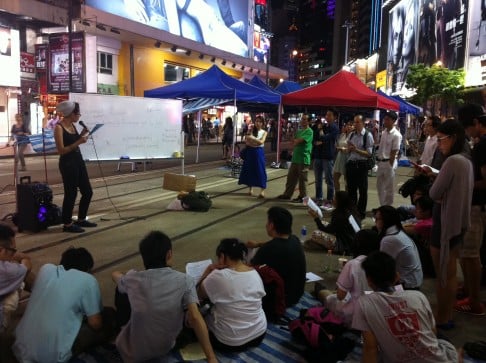 Gu's motivation is simple: "I wanted to help with something I know." She has also been running a blog about the Occupy movement in Mong Kok.
Meanwhile, public forums continue at Hennessy Road, on the problems of the private housing market in Hong Kong and the relationship between public spaces and the democracy movement.
Gu's motivation is simple: "I wanted to help with something I know." She has also been running a blog about the Occupy movement in Mong Kok.
Meanwhile, public forums continue at Hennessy Road, on the problems of the private housing market in Hong Kong and the relationship between public spaces and the democracy movement.
8.30pm Mong Kok: A large sign reading "against Occupy Central" and "against blocking of traffic" is hung over an arch right beside the main Occupy Mong Kok protest ground drawing curious glances from passers-by and demonstrators.
8.15pm: Kindergarten classes in Wan Chai and Central and Western districts will resume tomorrow, the Education Bureau announces. Principal Assistant Secretary for Education Sophia Wong says during a press conference that, as primary and secondary school classes have resumed with fewer late-for-school cases, the bureau decided to allow kindergarten classes to resume, also.
— Hong Kong Govt News (@newsgovhk) October 8, 2014
7.50pm: Occupy Central organisers say they have no immediate plans to form an alliance with the Federation of Students, dropping a strong hint that Friday's dialogue with the government would likely involve students only, not Occupy campaigners.
The students are preparing for the dialogue while Occupy provides them with opinion and lines up social groups in managing the occupied sites, says Dr Chan Kin-man, an Occupy organiser. "As of now, such a mode of cooperation is mutually acceptable to both sides," Chan says.
"The students have considerable capability to handle the dialogue," Chan says. "The HKFS is also willing to listen to Occupy's views. The cooperation between [us] is very close."
He also rebuffs Cardinal Joseph Zen's call against a continued occupation, saying there should be no retreat "before the dialogue yields any result".
The Federation of Students’ Lester Shum says the group is yet to agree whether the five representatives at the dialogue would include any non-members of the federation. Chan only says that the Occupy side is "very happy to provide assistance" given the scholarly background of its main organisers.
7.40pm: Guitar teacher Bernard Yim, 34, is jamming with other musicians at the protest site in Yee Wo Street, Causeway Bay.
"I've been coming to here, Admiralty and Mong Kok every day, and today, because of the autumn weather, instead of practicing guitar at home, I decided to practice outside," he says.
Yim says he has few expectations of the negotiations between government officials and students.
"Those who have been coming out hold a strong belief that we should remain here," he says.
7.25pm: Photos just in of the crowd near government headquarters at Admiralty tonight ...
7.15pm: Scholarism convenor Joshua Wong is distributing leaflets with other members of the student activist group outside Wan Chai MTR station to explain why roads have to be blocked to fight for genuine universal suffrage.
"Sorry about the [disturbances] in recent days," says Wong as he hands outs leaflets to pedestrians.
Some reply saying "We support you" or "Keep it going" when they receive the leaflets.
But there are also passersby who refuse to take them.
The leaflets seek to answer 16 questions that the public might have about the civil disobedience action.

7pm: Kindergartens in Wan Chai and Central and Western districts will resume classes tomorrow, says Principal Assistant Secretary of the Education Bureau Sophia Wong.
She says the bureau made the decision because kindergartens had made preparations such as diverting road traffic for picking up students and making arrangements with parents and "nanny buses".
Assistant Commissioner for Transport Albert Su says he expects traffic congestion to be more serious tomorrow because all the nanny buses and other vehicles for kindergarten children would return to the roads.
Assistant Commissioner for Transport Albert Su says he expects traffic congestion to be more serious tomorrow because all the nanny buses and other vehicles for kindergarten children would return to the roads.
"We are very, very concerned about the traffic condition tomorrow," says Su. "It's possible that a very serious situation will occur."
Su again appealed for the protesters to remove barriers blocking the city's major roads. He adds that he respects the police's decision to handle the situation through dialogue.
Central and Western District Officer Cheryl Chow says residents in Western District had to endure more difficulties to commute because there is no MTR connection in the area.
6.50pm: A group of some 20 North District residents has gathered outside Next Media boss Jimmy Lai Chee-ying’s home in Kowloon, a few kilometres from the Mong Kok protest site.
The anti-Occupy protesters hold banners accusing Lai of colluding with foreign governments. "When good old America comes up with a plan, the fat guy pays for it," one sign reads, referring to Lai.
Deng Ren-ming, 65, says that although pro-democracy protests were taking place far from where he and fellow protesters live, those who work in Kowloon and Hong Kong Island still feel the impact.
Deng Ren-ming, 65, says that although pro-democracy protests were taking place far from where he and fellow protesters live, those who work in Kowloon and Hong Kong Island still feel the impact.
"The thing is we don't know when it will end," he says. "We also want to support those, for example, who live in Mong Kok and are affected."
Asked why the group chose Lai's house to stage the protest, he says: "It's all written on the banners."
"Whether it is as what the banners suggest, Lai should come out and explain," he says.
The group leaves after half an hour when police arrive at the scene.
6.30pm: A maths class is underway at Yee Wo Street in Causeway Bay.
Chris Lau, 20, a Year Two physics students at the the Hong Kong University of Science and Technology, is teaching "simple formulas" to the public.
He says the lesson targets Form Four to Form Six students. "Since over the past few days it’s been hard for some to catch up in school, I want to help them," he says. "I hope they also have the chance to become university students as I am."
Lau thinks that at this point his role in the protest has changed. "I was in the frontline, protecting the occupied areas, but now it's peaceful, so I can help with other things," he says.
Some 20 people are paying attention to his class.
6.15pm: Some 150 protesters are now at the Mong Kok site as people get off work and school. The crowds in the area are also getting bigger as throngs of bystanders flock to the public forum to listen to speeches.
University student Joyce Lam Lok-tune, 21, is doing some reading for class under the main tent
She says she will remain encamped there until she feels the students' have reached an acceptable agreement with the government on civic nominations.
"Calling for Leung Chun-ying to step down is not the main point. We need a change in the system and a chief executive election based on civic nomination," she says.
6pm: Crowds are building once more at the main protest site near government headquarters in Admiralty.
5.45pm: Hong Kong-born Dawn Wong Hang-yue, 29, returned to her home city to join the Occupy movement after two years living in Sweden, where she just finished a master's degree in child culture design.
While on holiday in Hong Kong in September, she joined the first days of the students' strike and participated in public lectures at Tamar Park. "It was so peaceful ... And I thought it was a great way of learning how to think critically out of the classroom," she recalls.
Wong returned to Sweden and followed the news about her home city. She saw the students occupying Civic Square and some being arrested. The following day, she saw tear gas deployed against protesters. And she felt she had to come back.
Wong arrived in Hong Kong on Friday. "Unlike other protests this one is not organised by politicians. This is led by students," she says. "I think this is the time to fight for universal suffrage ... We shouldn't wait longer, because then might be too late."
She has spent the last few days at the protest sites, mostly in Admiralty, but also in Mong Kok and Causeway Bay. Wong decided to come to Causeway Bay today, because she visited last night and found it had fewer protesters than other sites.
She says protesters should not abandon Causeway Bay and Mong Kok. "If something happens in Admiralty we can gather in other places, and it's also a way of spreading the message to a larger audience," she says.
Wong says she hopes for "good results" from the meeting scheduled on Friday between students and the government, but whatever happens she vows to stay in the streets until the "last minute".
Then, she will go back to Sweden but not for good. "I will stay there to gain some experience overseas and, hopefully, I will come back in less than five years and contribute to my home city," she says.
5.35pm: Police say they have arranged negotiators to communicate with Occupy protesters and try to persuade them to remove road barriers.
The announcement comes after several road sections with barriers were seen empty with no or few protesters occupying and more residents starting to express discontent over traffic jams.
When asked why police did not remove barriers, Chief Superintendent of the police public relations branch, Steve Hui Chun-tak, says they would evaluate situations at the scene before taking any action.
Meanwhile, an ambulance heading to an emergency was more than 40 minutes late yesterday due to traffic jams caused by Occupy Central, says Deputy Chief Fire Officer Leung Wai-hung.
Leung says the Fire Services Department received a report of a student slipping over at a school on MacDonnell Road in Mid-Levels around 1pm. It took the ambulance 52 minutes and 35 seconds to arrive at the scene, more than 40 minutes past its promised time.
Ambulances were launched 1,689 times yesterday, with 86 unable to reach the scene within the promised time. Fire trucks were required 69 times yesterday. Eight could not reach the scene within the promised time.
5.25pm: More from Robert Chow Yung:
In response to a question from a Wall Street Journal reporter about whether or not Chow was linked to the triad attacks in Mong Kok, Chow says: "I’m not sure the Wall Street Journal is familiar with Mong Kok. Mong Kok is probably the biggest area where our underworld makes the most income.
“If you stop Mong Kok from operations, and the underworld suffers, they will do something. So there is no question of anyone organising, it could very well be that they are one of the victims of this very movement. I am not supporting the triads.”
"The important thing is, don’t ask whether it’s a wealthy person, whether it’s a poor person, people have a right to be angry if their normal lives are interrupted."
Chow urges the Occupy Central protesters to negotiate with the government on Friday and end the roadblocks as soon as possible.
5.20pm: Robert Chow Yung, spokesman for anti-Occupy group, the Alliance for Peace and Democracy, asks protesters to go home, saying they don't have the support of most Hongkongers.
Speaking at a press conference, Chow cites his group’s petition campaign, which he says gained more than 1.4 million signatures against Occupy Central in August.
"This cannot go on. I think Hongkongers are already very, very, very impatient and want to get back to their normal lives," Chow says. "We’re studying our next move. Without the voices of ordinary Hongkongers, we might not be able to convince the protesters Hongkongers don’t support them, that most people want them to go home."
Fellow spokesman Stanley Ng Chau-pei also says that in addition to residents, unions and various groups contacting the alliance to complain about Occupy Central, the group has also fielded calls from lawyers volunteering legal advice to people who have been affected by the protests.
"In the future, we’ll look into how we can help these affected parties air their grievances and whether the lawyers can help them. We’re forming a cadre of lawyers to give free legal advice for exactly that – to help affected citizens," Ng says. "We can’t tell you in detail because we’ve seen that anyone who speaks out will be attacked from all sides."
The alliance also shows plastic signs designed to resemble Facebook's “Like” button, calling on people to "like" the police.
"Right now the police are a punching bag and this isn’t right, so we want all Hongkongers to ‘like’ policemen if they pass officers in the street," Chow says.
5.10pm: Broadcasting on US television, comedians Jon Stewart, Stephen Colbert and John Oliver offer a satirical take on the protests.
READ: US comedians poke fun at CY Leung's daughter, China censorship in Occupy news spoofs
5pm: These photos just in from Admiralty, where the protesters seem to still be well-stocked with food and other supplies …
4.10pm: A mainland student accused of punching senior Post editor Cliff Buddle has pleaded not guilty to common assault.
Liu Lu, 26, at first intended to plead guilty but had to change his plea when he disputed a part of the indictment which alleged he posed as a University of Hong Kong student to get into the classroom.
During the media law and ethics lecture, Liu demanded that Buddle should speak in Chinese instead of English (the sole medium of instruction at the school). Then Liu allegedly started to punch Buddle several times. Liu, in his defence, told the Eastern Court today: “I used a notebook, and it came into contact with him.”
Liu said he was a student at Beijing’s Tsinghua University, and he is in the city on a travel visa. The trial is set for October 31.
READ: Student accused of attacking senior Post editor Cliff Buddle pleads 'not guilty'
4pm: Yip Wing-shing, chairman of Central and Western District Council, and Suen Kai Cheong, chairman of Wan Chai District Council ask for talks with student representatives at the Admiralty protest site.
Yip says that traffic in the area has been severely obstructed by the Occupy movement.
He says that nearly a thousand minibuses are affected every day. “We respect your will. But please spare a road for residents," he adds.
Eddy Chan, a City University graduate, bows for five seconds in front of the cameras and apologises for causing inconvenience to road users. He calls for government officials to come down to Queensway to talk to students.
3.30pm: Some 50 people are occupying Causeway Bay, with many taking a nap, reading or chatting. It's a calm afternoon in the area near the Sogo department store.
Makit Mak is the only protester guarding the barricades erected on Yee Wo Street, Hennessy Road and other secondary arteries. Mak, 23, a media designer, is sitting on a chair, manning the metal barriers at Hennessy Road, named by the protesters as "Citizens' main road", while reading a book about kung fu and internal conflict.
After spending the last few days in Mong Kok, he came for the first time to Causeway Bay. "I wanted to see how other [protest sites] looked,” he says “No one asked me to stay here, I just felt I should help safeguard this area. It's a way of standing against the government."
Mak explains that his main aim is "to protect the students." Since last week, he hasn't gone to work in order to do so. "My boss knows that I wanted to help, he supports me ... but no money," he says with a smile. Later today, he says he will go back to Mong Kok, "because the pro-Beijing supporters may try to do something again."
3.20pm: The Federation of Students says the government “distorted” its views in preliminary talks last night.
In a statement issued at 1.45pm, the federation hit back at undersecretary for constitutional and mainland affairs Lau Kong-wah, who it said inaccurately summarised to the media the federation’s views expressed in the meeting.
“At the meeting the HKFS expressed our angle and disappointment about officials’ demand to talk about constitutional basis and legal requirements,” the statement reads. “The HKFS stated to them the government must solve the political problem in political ways and must not deal with us with gimmicks.”
The students call for the government to stop playing with the legal arguments in negotiations on Friday.
3.15pm: An Australian newspaper has published a report questioning an alleged undisclosed payment of HK$49.9 million from an Australian firm that Chief Executive Leung Chun-ying received but failed to disclose upon assuming office. The Age report said Leung's office responded by saying he did not have to disclose the payment.
The Post is currently verifying the details stated in the report.
3.10pm: Is the United States government behind Occupy Central? Well, someone seems to think so …
A conspiracy theorist with blue ribbons tied to her bag shows up at the protest site in Mong Kok, screaming that Occupy Central was propagated by the United States government "just as the September 11, 2001 attacks on the World Trade Centre were".
She claims the US government has also engineered viruses such as Ebola and Aids in poor countries to keep them underdeveloped. She is dressed in a T-shirt emblazoned with Chinese national team Olympians. Police escort her away.
3pm: The New York City Bar Association has written an open letter to Leung, expressing its “grave concern” over the treatment of Occupy Central protesters.
Debra Raskin, president of the association, urged the Hong Kong government to “take all necessary measures to protect the right to freedom of expression and assembly” in the strongly-worded correspondence.
READ: New York City Bar Association backs protesters in open letter to CY Leung
2.35pm: A group of angry middle-aged men and women attempt to remove barriers at a section of Argyle Street in Mong Kok, causing a commotion.
There are mainlanders among them. There is bickering and swearing between both sides.
Police form a line to separate them from going near the protest zone.
Meanwhile, a man who is against the movement arrives, shouting and claiming he is looking for his son in the Occupy Mong Kok camp.
2.30pm: In Admiralty, pro-democracy protesters are pessimistic about the talks on Friday between the Federation of Students and Chief Secretary Carrie Lam.
Financial consultant Danny Leung, who brought his lunchbox to Harcourt Road, says he is not optimistic about the dialogue because the government is not sincere enough. “The talks will be based on the framework laid down by the central government. I don't think it will be a constructive dialogue,” he says.
Sam Choi, a Year Two Chinese University student, also expresses pessimism over the talks: “I don't think the talks will result in anything concrete because the government is just following the central government's instructions."
Choi expects more Hongkongers to join the movement if the talks fail. He also urges student leaders to continue with the sit-in. “Whether we will succeed in the end depends on how persistent we are," Choi says.
2.10pm: A small Japanese/Korean restaurant in Causeway Bay is offering price cuts in support of the pro-democracy movement.
"Support the Umbrella revolution, Hongkongers get 20 per cent discount," says the sign outside the restaurant on Lockhart Road.
1.55pm: Protester Esmond Lam Chun-him, 18, admits he wants the movement to end as soon as possible but whether he leaves the Mong Kok site depends on the outcome of talks between students and the government, the first of which will begin on Friday.
"We can't just sit here forever. Somebody has to initiate dialogue with the government," the Year One civil engineering student at Polytechnic University says.
Although Lam is camped in Mong Kok – where protesters have stressed they are an autonomous protest and different from Occupy Central – he says he considers the Federation of Students the leaders of the movement.
"I'm looking for something concrete like the promise of civil nominations. We should forget about impractical stuff like making the police apologise," he says
Lam says if the talks are successful he will get up and leave voluntarily but if not, he will stay and even prepare for possible clearance by police.
"I will probably resist but I am prepared to be arrested if necessary," he says.
Some 20 volunteers remain at Occupy Mong Kok. One of then, Prince Tse, 28, says they are prepared to leave if talks are successful.
"If the talks work out, there's no need to be here. If they don't, then we'll stay," Tse says.
"Whether Leung Chun-ying steps down is no longer important. We are looking for a change in the political system."
Asked what the arrangements would be if police clear the place out, Tse says the elderly and children will be asked to leave first. Those who want to stay can do. "Adults can make up their own minds," he says.
1.45pm: Here’s a selection of views from the remaining protesters in Causeway Bay …
“I don’t have much of an opinion on the talks. At least the government’s not jerking the protesters around; that’s already good news to me.”
Lau Ka-man, 24, customer service representative, been in Causeway Bay for the past eight days
“I think the government is toying with the students. They're not planning to talk about the key issues that can resolve the Occupy situation. Now, I acknowledge that it's going to be hard for the [National] People's Congress to retract its own decision; they want to save face for one thing. I'm just an ordinary citizen, but why not think about letting people vote to decide who gets on the nominating committee? If the government doesn't talk about universal suffrage with students, then it's just wasting time.”
Cheung Ka-ling, 56, housewife, been coming to Causeway Bay every morning since Monday, except on weekends
“The whole movement is about universal suffrage and democracy, but in the end we're part of China so Beijing will always have a say. But why not expand the nominating committee so more than half are elected by Hongkongers, so we can choose people who can speak for us and not Beijing?”
Tsang Siu-Chung, 20, programme organiser for social welfare, protesting since last Monday
1.35pm: Two parents, who don't want be named, distribute leaflets in the occupied area near the Sogo department store in Causeway Bay.
The message, written in Chinese, says that there are some 60,259 children living in Central, Western District and Wan Chai. The protesters are blocking some of them from going to school, and school buses are taking about an hour to do a trip that normally takes only 15 minutes, says the man handing out the leaflets.
"There's only a small crowd here, why can't they move to another public area, like Tamar Park?" he asks.
The message ends with a request: "Don't use our kids as bargaining chips!"
1.25pm: These photos just in from the main protest site near government headquarters in Admiralty ...
1.15pm: Cardinal Joseph Zen Ze-kiun, former leader of the Hong Kong Catholic Church urges protesters to leave Occupy sit-ins. He says that the police’s use of tear gas has given protesters victory over the government and it is now time they left.
“The government admitted failure by using violence. Is it possible to hold sensible discussion with a government that is unreasonable?” Zen writes in his blog, posted on his Facebook page and on the website of the Hong Kong Diocesan’s audio-visual centre today.
“Yes, you can stand for now. But for how much longer are you prepared to stand? For an indefinite time?”
Zen says withdrawing from the protest sites now would help members of the Umbrella movement keep their strength and allow them to prepare their next moves in the long-term fight for democracy.
“The government wants things to drag on. We must not be trapped by its tricks. Public opinion remains on our side. We should not let the public pay too much,” he says.
“It is time to let students go back to school, let ordinary people go back to work.”
Zen says protesters are in an unfavourable position compared to their opponents.
“We are exposed in sunlight while the enemy is hidden in the dark. We are non-violent,” he says.
“The longer it drags on, the more unfavourable to us it will be.”
The cardinal cites the 1989 Tiananmen Square crackdown as an example to warn that late withdrawal could lead to tragedy:
“Youngsters at Tiananmen had decided to retreat. But some newcomers from other provinces said: ‘We just arrived and you are saying it’s over?’ The outcome was the loss of many lives.”
1.05pm: Here's Harry's View on the protests from today's edition of the Post:
1pm: German Consul-General Nikolaus Graf Lambsdorff praises the youth of Hong Kong for their enthusiasm, after an event held last night to celebrate the 24th anniversary of the reunification of Germany after the fall of the Berlin Wall – attended by Chief Secretary Carrie Lam.
"For all of us the last few days were exciting and thrilling," Lambsdorff says, according to a copy of his speech, made in German, published on the consulate's website today.
"It is not for me to publicly judge political developments in Hong Kong. But especially in the light of our own recent German history, I believe that Hong Kong can be proud of its youth. I am sure that the efforts to make Hong Kong more democratic will be good for Hong Kong politically, but also economically."
A statement on the German consulate's website warns citizens in the city to "avoid the places of assembly and to closely follow the updated situation in the media" as it cannot "be ruled out that the protests escalate again."
The Post revealed last week how the Foreign Ministry pressured consuls general in the city to avoid the protests and encourage their citizens to do so as well.
READ: China warns foreign diplomats in Hong Kong to ‘stay away’ from Occupy Central
12.45pm: The Chinese ambassador to Canada hits back against the Canadian government's support of Hong Kong’s pro-democracy protests, stressing that “stability is a must”.
Envoy Luo Zhaohui, speaking to businesspeople in Toronto, is quoted byThe Globe and Mail today as saying stability is crucial for China’s “deepening economic reform”, adding “we have to abide by the law”.
Relations between Canada and China have been frayed by allegations of espionage, Beijing's human rights record and the Canadian government’s vow to press Beijing on allowing the Hong Kong civil disobedience movement to continue. Despite the tensions, Luo stresses both countries should strengthen trade.
“I’m quite optimistic the issue [of Occupy protests] will be resolved peacefully. Sometimes there are … some problems that block bilateral relations,” Luo said, according to the report.
12.30pm: Everybody is kung fu fighting in Causeway Bay. Well, not everybody, but a group of street performers are taking advantage of the empty space, drumming and performing a kung fu demonstration.
They've drawn scattered applause and a small crowd of around 50 onlookers.
After the performance, drummer Miu Kei-yuk of Oriental Martial Arts tells onlookers that he came to the site with friends last Thursday, when they attempted to pull down the barricades. He says a lot of his friends have developed anxiety disorders and depression because they've been worried about the effect of the protests on their lives.
He says he's politically neutral, but Taoists and Confucians believe in yin and yang, so there are no absolute rights and wrongs. He says everyone should stand in the grey areas while assessing a situation.
Miu says he hopes people won't mind his intrusion. He claims his group has helped teenagers back onto the right path after the government deemed them hopeless and sent them to him. He says he hopes people will take down the barricades and reopen the streets, if they think there's even an ounce of sense in what he's saying.
He kneels down in front of the crowd and kowtows after this. He admits that as a kung fu practitioner, he was a little impulsive when he and his friends tried to take down the barricades.
12.25pm: Occupy Mong Kok witnesses its first street dispute of the day, after several hours of peace and quiet.
What began as a relatively civil debate about the Communist Party’s creeping influence on Hong Kong ends with an elderly man being escorted away by police after he began hurling profanities at the protesters.
The man says he is "anti-Occupy Central" as he tells protesters to go to the city’s financial hub to make their views known.
One protester replies that they too, are against Occupy Central: "This is Occupy Mong Kok! Those against Occupy Central can leave! We have nothing to do with them."
As the elderly man becomes more aggressive, police pull him away as the protesters sing the now familiar refrain of the happy birthday song.
11.39am: Police currently outnumber the protesters staying in front of CY Leung's office, on Tim Wa Avenue in Admiralty. Seven protesters huddle under umbrellas while 13 officers sit or stand behind the metal barricades.
But despite their diminished numbers, some demonstrators remain upbeat. George Wong, a Year Three university student, said: “I am not worried the small number of protesters here as they will rejoin in the evening."
Wong said many people left at about 7pm last night so they could go to work or school. He expects to see a larger turnout on Friday, when student representatives meet with government officials.
Another university student, Ming Chan, who arrived this morning, said many of his friends have left because they couldn't afford skipping class for so many days. “It is completely understandable," he said. “Also, the examination period [for university students] is coming."
11.05am: The atmosphere is sleepy and sedate at protest camps across the city. There are exactly 33 people in the Causeway Bay site, according to a reporter in the field. People are sleeping, reading newspapers or browsing on their phones.
Across the harbour, in Mong Kok, there are about 80 people also milling about, reading or sleeping.
10.43am: Civic Party lawmaker Dennis Kwok called on the Standing Committee of the National People's Congress, the nation's legislature, to rethink its stance on Hong Kong election reform, according to RTHK.
Kwok, the Hong Kong Legislative Council's legal representative, said Beijing's stubbornness on the issue caused the "political crisis" in the territory, the report said.
He urged CY Leung's administration to engage in genuine dialogue with the students.
10.15am: Volunteers are distributing free coffee, brown rice tea and pineapple buns to the protesters in Admiralty. An estimated 100 protesters are scattered along Harcourt Road this morning. In previous days, numbers typically fall in the morning as some protesters head to work or school, then it picks up again after hours.
Meanwhile, hunger striker Benny Mok had first-aid volunteers worried when he disappeared from his spot near their tent. The volunteers went around Admiralty with a sign, looking for him. It turned out Mok just went back to his original perch, in a different area, to give three media interviews.
Mok said he liked the spot because there were two security cameras there.
9.46am: Hunger striker Benny Mok Siu-man has decided not to turn himself in to police today as planned.
Mok wanted to surrender to police for illegally occupying the road as a symbolic act. However, the former government surveyor, who has been on hunger strike for seven days to push for genuine universal suffrage, said his lawyers have advised him against the move as it would put himself and the Occupy movement at risk.
“If I turn myself in, I have to provide evidence to prove my guilt," he said.
Mok was there when police fired tear gas at protesters on September 28, the day that Occupy announced the start of its civil disobedience movement. He has said he wanted to awaken Hongkongers to the need for democracy. While on hunger strike, he has been giving numerous interviews to the foreign and local press and is regularly visited by doctors and nurses, he said.
9.05am: Civil servants head to work at government headquarters in Admiralty through the footbridge from Admiralty Centre. A passage has been left for them to walk through.
Kitty Choi, director of administration, called for protesters to clear way for vehicles that collected government mail.
9am: Dozens of bus routes have been suspended as pro-democracy protesters continue to block major roads in Admiralty and Mong Kok.
8.45am: Crowd estimates at protest sites by our reporters on the ground:
Admiralty: 100
Mong Kok: 200
8.30am: Here's a look at the Post's front-page on Wednesday:
8.15am: Excerpts from the Post's coverage of the Occupy movement in our print edition on Wednesday:
The Post talked to people around the city to find out what life has been like in occupied Hong Kong.
A source with direct knowledge of the study said it aimed to gauge if investors had changed their assessment of Hong Kong and its economic prospects in the wake of the demonstrations.
Despite the talks, Federation of Students' deputy leader Lester Shum said the protests would continue until there were clear signs of progress.
An investor said takings at his restaurants in Causeway Bay and Mong Kok had declined HK$100,000 per day since major traffic junctions were blocked.
A growing number of conflicts have emerged including over when to retreat from protest zones and what concessions the protesters might accept.
Some officers worked 24-hour shifts trying to negotiate pathways for emergency vehicles and defuse tensions between frontline police and protesters, often amid a barrage of insults and with little success.
8am: The front-page headlines of major local newspapers on Wednesday:
Apple Daily: The students and the government agree to talk on Friday. The government insists to discuss constitutional and legal issue first. The students warn: Don't fool Hongkongers
Oriental Daily: Occupy Central tears society apart. Arguments spread rapidly, relatives turned into enemies
Sun: People weep over severe traffic congestion as they go to work, return to schools
Hong Kong Economic Journal: Hang Seng index rises for three consecutive days, compensates the impact made by Occupy movement
Hong Kong Economic Times: Economy faces double blows by the Occupy movement's potential impact and interest rate increase pressure
Ming Pao: Dialogue set for Friday that covers the constitutional and legal basis of the constitutional development, Federation of Students disappointed
Singtao: Friday's dialogue between Carrie Lam and students could break down
7.45am: Here's a summary of what happened overnight:
* Students expressed disappointment and anger at the dialogue agenda proposed by the government for talks on Friday, but decided the dialogue should go ahead to confront the government with the students' demands for universal suffrage and the dismissal of Chief Executive Leung Chun-ying.
* Hundreds, and at times thousands, or people converged at the protest site in Mong Kok in the night to Wednesday, debating the future of the pro-democracy movement and its impact on the territory's economy.
* Representatives of European Union countries stationed in Hong Kong expressed concern about the Occupy protests in an annual meeting with the city’s lawmakers.
* No major confrontations between critics and supporters of the Occupy movement occurred. Police did not attempt to clear protest sites.
IN CASE YOU MISSED IT: Hong Kong's Occupy Mong Kok has become a scene of political discourse:
http://www.scmp.com/news/hong-kong/article/1611911/live-remaining-occupy-protesters-wary-government-dialogue-set-friday
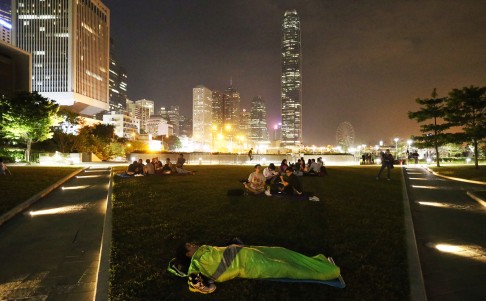

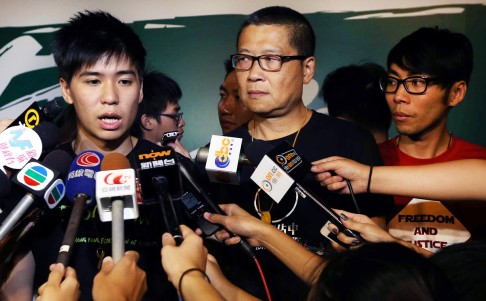
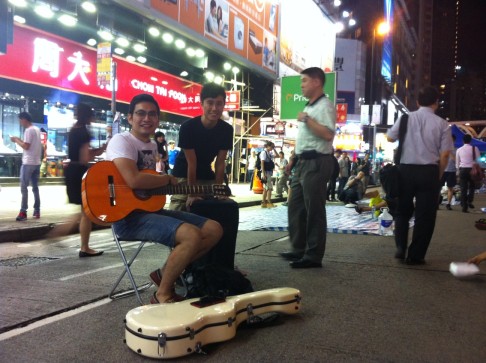
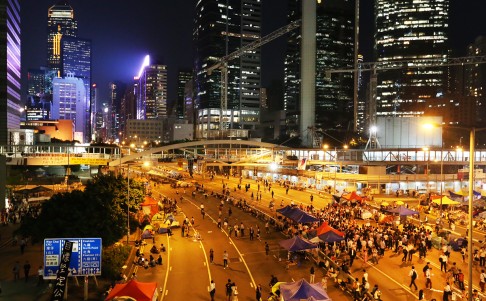
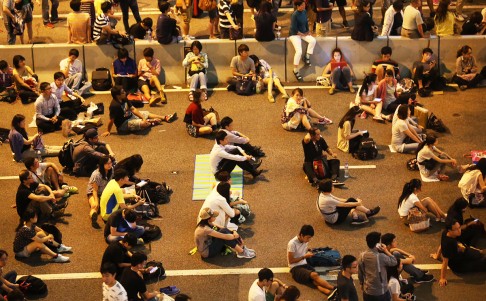
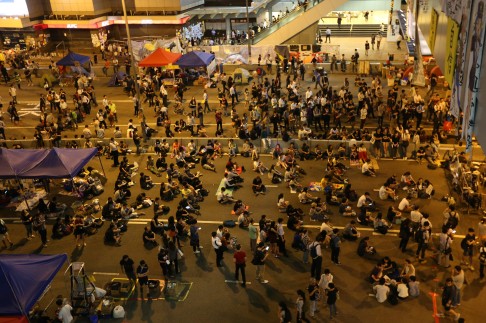
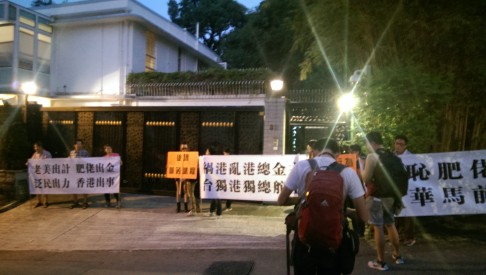
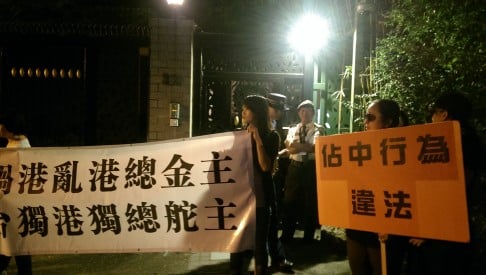
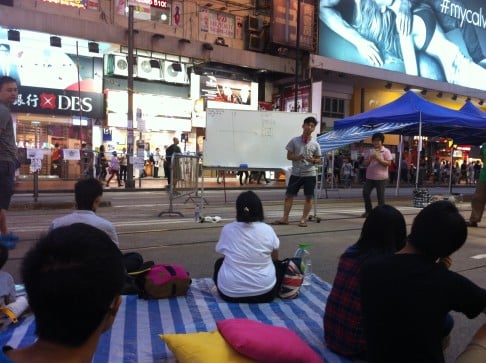

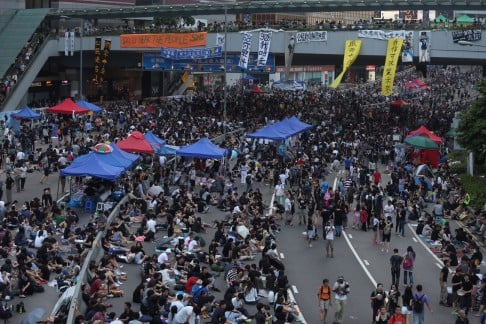
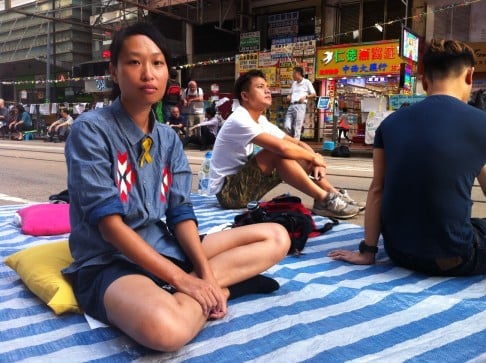
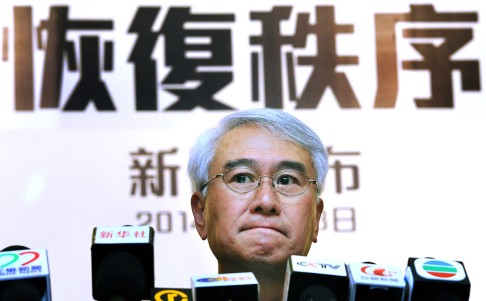
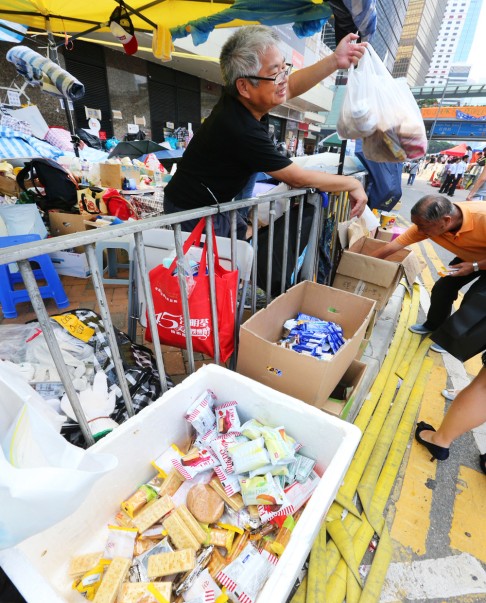
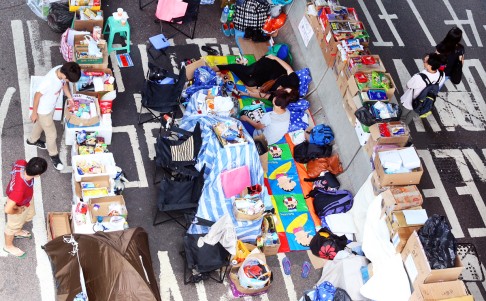
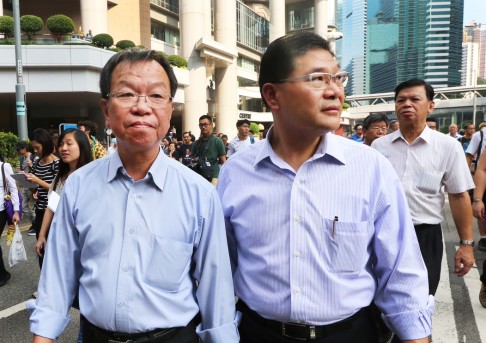
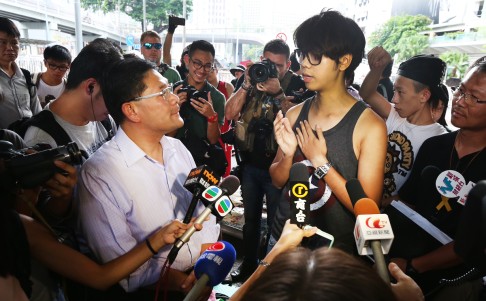
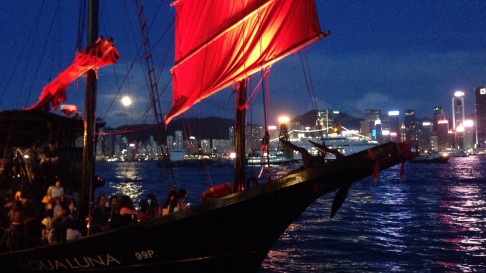

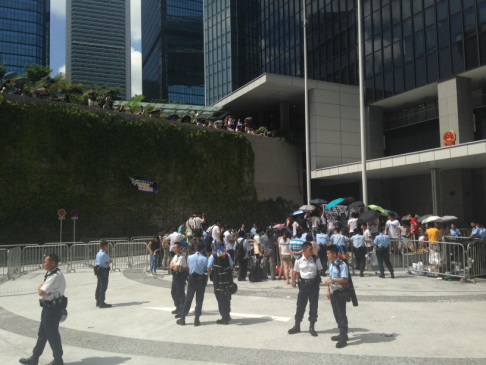
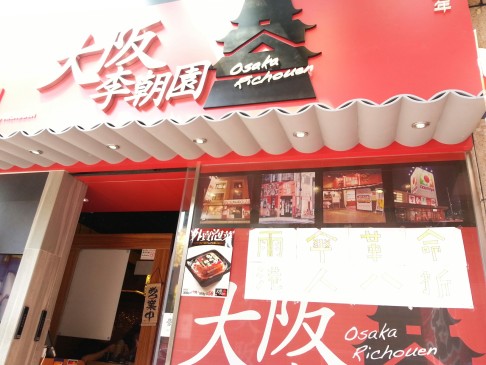
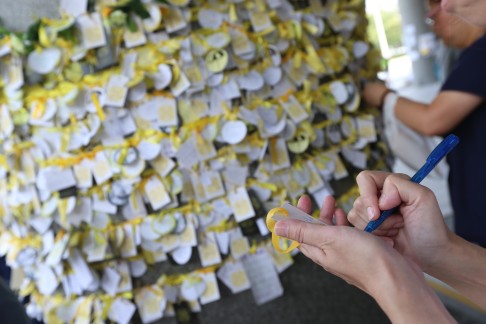
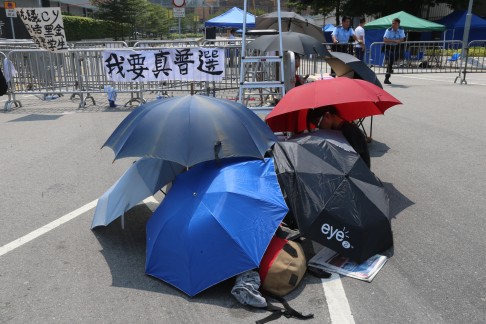
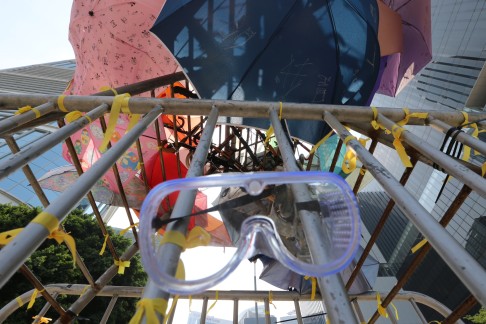
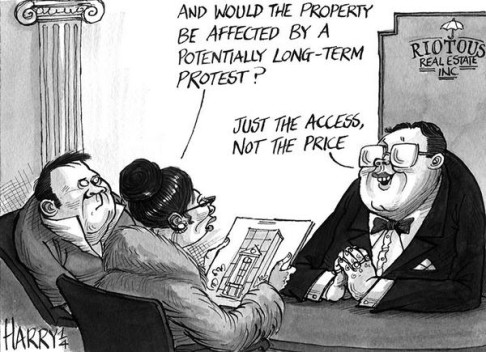
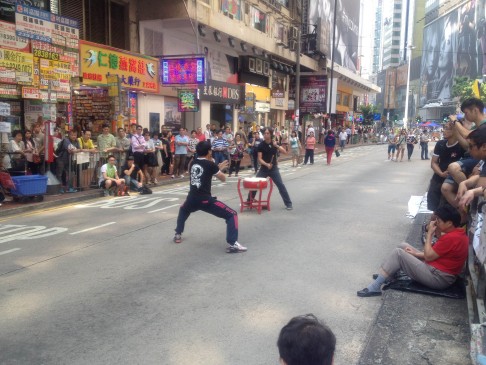
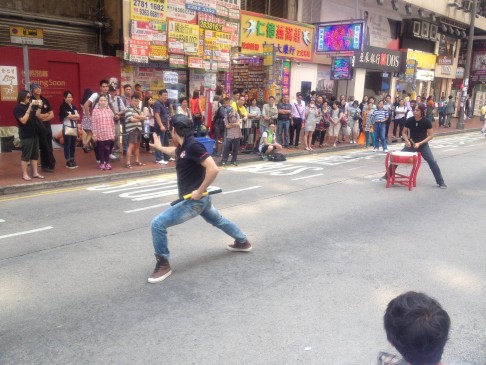
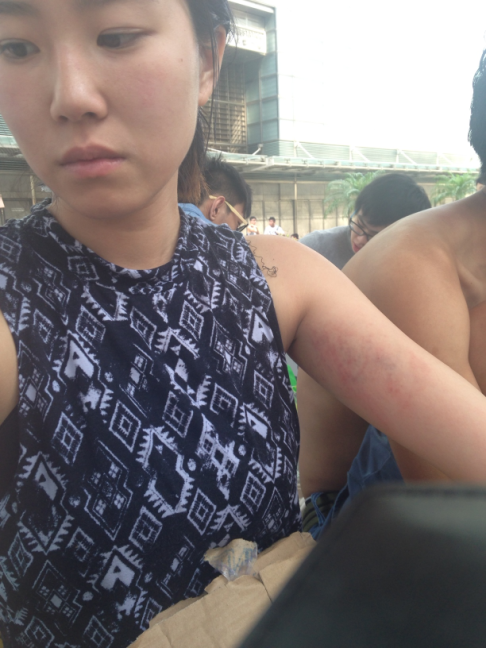
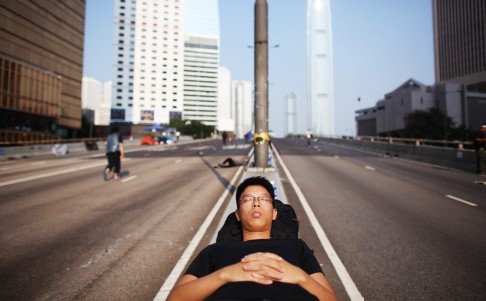
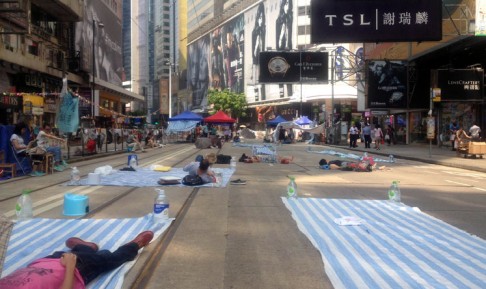
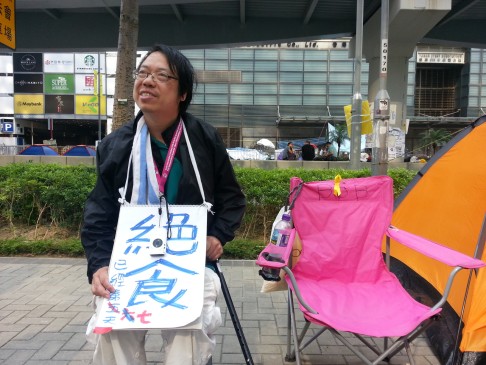
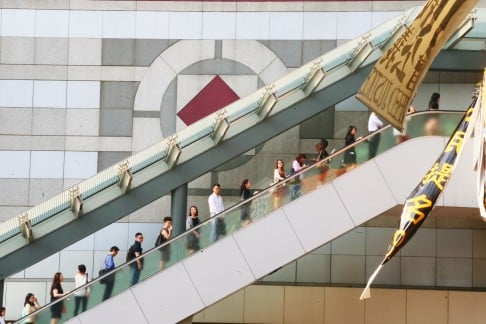
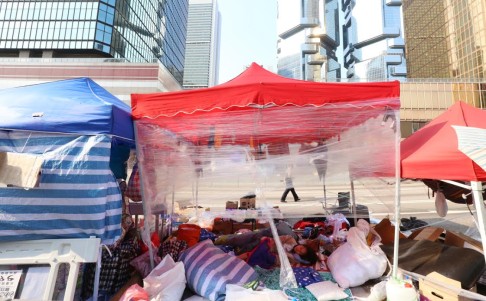
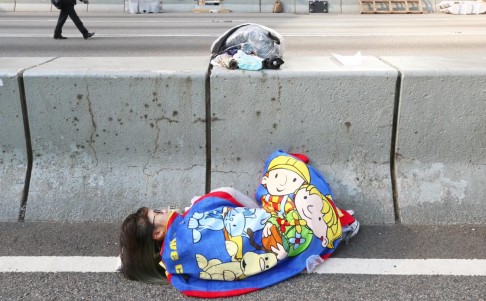

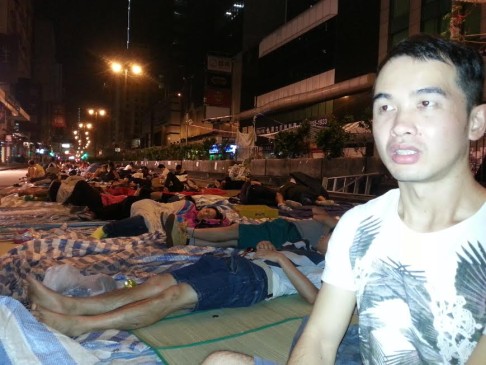
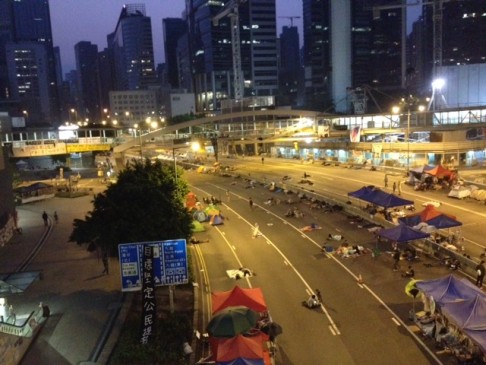
沒有留言:
張貼留言